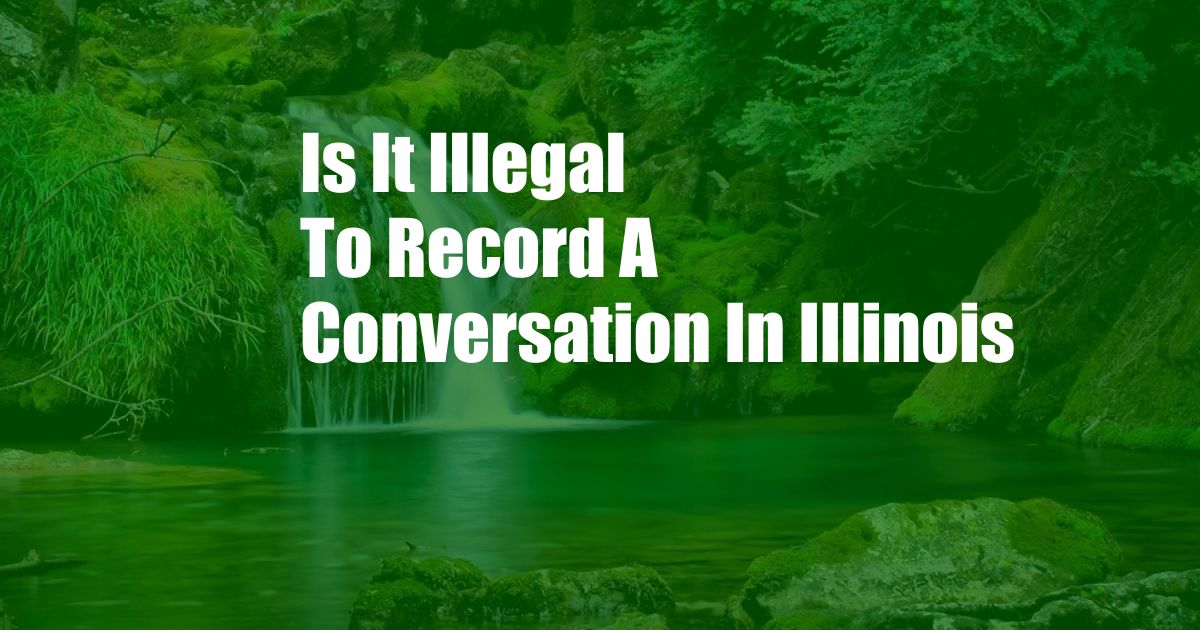
Is It Illegal to Record a Conversation in Illinois?
In a world where technology is rapidly evolving and personal privacy concerns are paramount, the legality of recording conversations has become a frequent subject of debate. The laws governing audio recordings vary significantly from state to state, and Illinois is no exception to this legal landscape.
The state of Illinois has implemented the Illinois Eavesdropping Act, a comprehensive statute that regulates the recording of conversations. This legislation establishes specific guidelines for the legality of audio recordings, ensuring that conversations are protected from unauthorized interception while also allowing for exceptions in certain circumstances.
Understanding the Illinois Eavesdropping Act
The Illinois Eavesdropping Act, codified as 720 ILCS 5/14-1, defines eavesdropping as the intentional recording of a conversation without the knowledge or consent of all parties involved. The law applies to both in-person and electronic communications, including phone calls, video recordings, and text messages.
According to the act, it is illegal to record a conversation in Illinois unless one of the following exceptions applies:
- Consent of All Parties: If all parties to the conversation explicitly consent to the recording, it is legal to record the conversation.
- Law Enforcement or Government Investigation: Law enforcement officers and government investigators can record conversations as part of their official duties.
- Emergency Situations: Individuals can record conversations in emergency situations to protect their safety or the safety of others.
- Public Records: Conversations that are part of public proceedings, such as court hearings or city council meetings, are not subject to the eavesdropping law.
Exceptions and Penalties
In addition to the exceptions outlined above, the Illinois Eavesdropping Act includes specific provisions that apply in certain situations:
- Telephone Calls: It is legal to record a telephone call if at least one party to the conversation is in Illinois and consents to the recording.
- Hidden Cameras: It is illegal to use a hidden camera to record a conversation without the consent of all parties involved.
- Penalties: Violations of the Illinois Eavesdropping Act can result in serious penalties, including fines and imprisonment.
Tips for Protecting Your Privacy
To protect your privacy and avoid legal issues, it is essential to follow these tips when recording conversations in Illinois:
- Always obtain consent: Before recording a conversation, make sure you have the consent of all parties involved.
- Use visible recording devices: If you need to record a conversation, use a visible recording device to avoid any misunderstandings or legal challenges.
- Be aware of the exceptions: Understand the exceptions to the Illinois Eavesdropping Act to ensure that your recordings are compliant with the law.
- Consult with legal counsel: If you have any questions or concerns about the legality of recording conversations in Illinois, consult with a qualified attorney.
Conclusion
Understanding the legality of recording conversations in Illinois is crucial for protecting your privacy and complying with the state’s eavesdropping laws. The Illinois Eavesdropping Act provides clear guidelines for when it is legal to record conversations, and it is essential to familiarize yourself with these exceptions to avoid legal consequences. By following the tips outlined in this article, you can safeguard your conversations and ensure that your recordings are compliant with the law.
Are you interested in learning more about the legality of recording conversations in Illinois? Let us know your thoughts and questions in the comments section below!